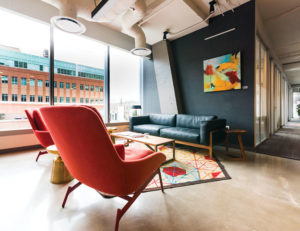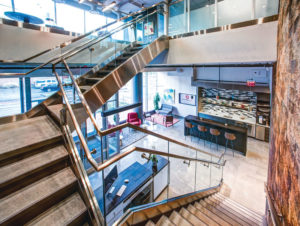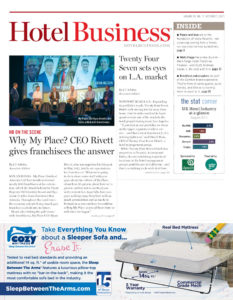NATIONAL REPORT—Hotel companies are always focused on hospitality—making guests feel like they’re at home, a part of the family—but some are looking at a complementary vertical to expand their business—coworking.
“Over the past five years, the coworking industry has grown from a hip, creative class movement for techies and millennials into a mainstream workplace option for the U.S. workforce,” said John Arenas, founder and CEO of Serendipity Labs Inc., a lifestyle hospitality company, offering premium workplace memberships, special events and work environments for members. “The workplace, like business travel, has now been consumerized with increasingly mobile employees seeking to work where and when they wish. In this very short time span, coworking has attracted billions of dollars in institutional investment into a sophisticated set of national networks.”
Additionally, he said, coworking has recently gained acceptance as a viable alternative for established companies that want to maintain agility to attract top talent. “More recently, we have seen institutional real estate investors underwrite coworking as part of their commercial office asset portfolio strategy as tenants require more flexible options than a 10-year lease,” he said. “The consumerization of work and the corporate workplace are transforming commercial real estate into a service-based, hospitality business.”
Last month, Serendipity Labs awarded franchises to three hotel industry veterans: 3H Group Hotels, SSM Hospitality LLC and hotelier and entrepreneur Trey Scott of Hunter Hotel Advisors. They will open and manage 17 new locations in Atlanta; Charleston and Greenville, SC; and Orlando and Tampa, FL, representing more than $20 million in capital.
And while these three may be the latest in the industry to look to coworking, they aren’t the first. Arenas said there’s a reason for that.
“Hoteliers understand how to deliver experiences and how to make the customer journey memorable from the first time a guest engages with the brand,” he said. “This means having attention to the smallest detail and anticipating needs, as well as being able to faithfully execute on brand standards. Our franchisees have those qualities.”

TOP TO BOTTOM: An inner stairwell connects the team rooms, offices and second-floor work lounge to the Lab Café and coworking area on the first floor of Serendipity Labs Bethesda. This represents the Design Standard for Serendipity Labs workplaces. Photos: Serendipity Labs/Brad LeBlanc
Dan McEwan, president and chief manager, Maximum Hospitality, a Memphis, TN-based hotel management company planning to open its first Serendipity Labs in the Nashville area this December, noted there were several reasons why the company expanded into coworking. “First, we noticed the obvious ways our work practices have evolved over time and the way guests work. Smartphones, iPads and laptops have shifted our ability to be productive in different ways and in different locations than were available 10-15 years ago,” he said. “As a result, we (and many others) view coworking as the logical ‘next step’ in providing a solution for tomorrow’s business demands. Another impetus for our entry into coworking are the similarities in what we try to provide our guests each day in the hotel/hospitality space—providing a high level of service to a guest at a hotel and at the Lab is not a big jump… We have always been a company that has looked for ways to grow and ‘get in early’ rather than be a follower.”
Paresh Master, president, SSM Hospitality LLC, noted it was a way to diversify yet stay within the company’s wheelhouse. “Coworking was intriguing and we were able to identify similarities in service and operation. We considered many factors: The industry is just beginning, and it reminds us of the early days of the franchise hotel industry; the coworking operation is easier to manage than a hotel as it requires fewer employees to run the whole operation; the coworking customer/member base is built for long term and therefore it gives a little more consistency; and coworking gives us the opportunity to expand our development growth.”
Both McEwan and Master said this also gives the companies an opportunity to cross-sell on occasion, for hotels and Serendipity Labs locations located nearby. McEwan noted that there can also be development advantages. “Our targeting of Nashville was no mistake as we have been part of five hotel projects in that market and are very familiar with its growth, along with the fact that it is well within our current footprint,” he said.
Master added that in the future, “Hotels and coworking will be merging. We can see developing a hotel with developing at least one floor to a dedicated coworking space.”
For his part, McEwan noted, “I often look at the world through my hotel lens. I think the coworking industry will evolve significantly over the coming years and the role of the brands will play a large part in that. For hotels, choosing ‘the right’ franchisor is colossally more important to a hotel’s success today than it was 25-30 years ago. We see a lot of diversity in the coworking products that are available today.
“I think that culture and consistency will be the determining factors for the ‘who wins’ question in coworking,” he continued. “I’m sure coworking preferences will shift the design here or there. But, the brands that deliver products and cultures that meet the greater demand will rise to the top and establish themselves as the ‘go to’ solution.”
Arenas said the company’s development pipeline of owned and franchised locations includes more than 100 Labs committed, and it’s growing rapidly with the addition of more sophisticated area franchise developers.
As for the future? “The coworking industry is evolving quickly due to high demand and the influx of capital and talent,” he said. “The growth rate of over 25% per year will continue to attract interest from mature, crowded industries like commercial real estate and hospitality. We are, in effect, already successfully competing for the attention and resources of hotel franchisees. While there was some post-recession dabbling by innovation teams at Hyatt, Marriott and Starwood into offering workplace services inside hotels, let’s see which one of the major hotel brands will decide to lead the workplace hospitality industry…assuming the commercial real estate industry does not beat them to it.” HB


